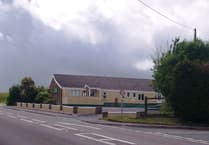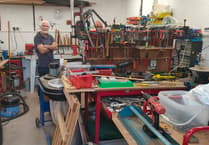Ask certain people in Whitland how many hours a week they work, and eyes start rolling.
Butcher Colin Harries says 80 hours, pub landlord Mike Adams reckons 100.
Web designers and printed chocolate makers Leeann and Barry Smith just laugh.
Nestled in the far west of Carmarthenshire, Whitland is one of 10 rural towns the county council has shortlisted to nurture and revitalise.
The idea is that strong market towns act as glue for surrounding villages, help ensure money made in the county is spent in the county, and protect the rural economy and the Welsh language.
A rural affairs task group set up by the council said 61% of Carmarthenshire’s 186,500 population live in rural areas, nearly double the Welsh average.
More people in the county are self-employed than average and more people with a job work longer hours.
Mr Harries, who runs the London House butchery – one of two such businesses in St John’s Street – said he’d had to extend his opening hours and diversify his offering.
Wine, sauces, marinades and biltong are mixed with more traditional butcher’s cuts.
“Without customers we wouldn’t have a job,” he says. “You’ve got to keep smiling every day.”
He wanted to be an architect when he was younger, but says with a slight glint in his eye that he “was talked into” his current trade 30 years ago.
“There have been lots of challenges along the road,” he says.
More than a hundred jobs went when Dairy Crest’s milk factory closed in Whitland in 1994.
“It was tough going,” recalls Mr Harries. “Whitland up until then was a very, very buoyant town.”
A new dairy plant was opened nearby in 2011, but that closed three years later.
The town had expanded around the turn of the 19th Century due to dairy farming and the expansion of the railway, allowing milk to be delivered direct to London.
Mr Harries says Whitland’s location is fantastic and praises its schools – with a grin aimed at Julian Kennedy, head teacher at Dyffryn Taf comprehensive, who happens to be in the shop at the time.
Mr Harries says the town’s commercial web is self-supporting.
“Every good business helps other businesses,” he says.
But the butcher bemoans the closure of NatWest – Whitland’s only bank.
“If you want a town to remain buoyant, you have got to have services,” he says.
Some banking services are provided at the post office in the newsagent opposite.
Behind the till is town mayor Barry Chapman and his mother.
Mr Chapman’s wife runs the cafe next door while his sister and brother-in-law own two shops nearby.
“They call it Barry street!” he says.
After working in the hospitality trade, Mr Chapman has put down roots in Whitland and has revived the town’s chamber of commerce.
“We pressure-washed the street, and I painted 10 shops,” he says.
“Our vision is a welcoming town which shouts to the wider community that we can provide everything.”
Mr Chapman says the NatWest building will be turned into a children’s nursery and that tenants are due to fill the town’s only other empty shop.
“It is a success story,” he says.
Like many people, the father-of-five says the train station’s central location is a major asset.
While in Whitland, whose population is around 2,000, I hear various estimates of the number of businesses.
Mr Chapman says it’s over 125, from self-employed electricians to builders’ merchants and large-scale engineering firms.
To borrow an American phrase, Whitland feels more Main Street than High Street with dairy farming and manufacturing very much a backbone.
Whitland Engineering services the dairy sector across the UK and also works with the food, drinks and utility industries.
Former joint owner John Donovan, who remains an adviser to the company, was the deputy manager of the milk factory when it closed.
“It was a huge event,” he recalls. “It had been there for generations and had developed a highly skilled workforce.”
Like a number of redundant factory staff Mr Donovan moved to Whitland Engineering, although his journey a few hundreds yards across town took 12 years while he ran other plants in West Wales.
Mr Donovan says a key milestone for Whitland Engineering was buying the site from Carmarthenshire Council in 2012 and then building a state-of-the-art fabrication workshop, storage facilities and staff training centre.
“We have diversified into electrical engineeering, mechanical engineering, automation and civil construction,” says the 60-year-old.
“We can do a new factory build or refurbishment from a concept plan, to help with planning permission and grants, then the build and all the engineering.
“A lot of systems are automated, and we’ve got a team of software engineers.
“These are high-paid positions for the area.”
He adds: “The dairy industry is still very important – about a third of our turnover – but we have to go further afield for it.”
Mr Donovan says recruiting such niche skills locally can be tricky – a view shared by Gareth Davies, a smartly-attired 43-year-old who works at Magstim, which designs and makes medical machines which monitor brain activity and treat depression.
“We’ve got about 90 staff on site – we do the research and development and all the manufacturing here,” he says.
I am led onto the shop floor, where the company’s transcranial magnetic stimulation (TMS) machines are being assembled. Queen is playing on a nifty sound system.
The highest-spec of these machines sell at just over £80,000 each.
Two years ago Magstim provided 35 of them to veterans’ hospitals in the USA.
“We’ve just won a big contract with a national chain of pyschiatric clinics in the US,” says Mr Davies.
“We are growing at 30-35% a year, and sell into 50-odd countries worldwide.
“Whitland is probably the largest manufacturer of TMS systems in the world.”
Mr Davies, site director and chief finance officer, grew up in Carmarthen, moved to Cardiff and now lives near the capital.
“We’re bringing talent from right across South Wales,” he says.
“We’ve had some people who relocate here. It’s a nice place to live, and a great work-life balance.
“We hold meetings here in English and Welsh, and everything in between.”
I am introduced to US-based chief executive officer Lothar Krinke, who says TMS is effective for “treatment-resistant” depression.
He says he would like to see more uptake of TMS depression therapy in the UK.
“We are really proud of this,” he says.
A US private equity company bought Magstim three years ago, and the board meet once a year in Whitland. Overseas clients also visit.
“I drive them up to a rural pub,” says Mr Davies. “Within 10 minutes you’re in lush green countryside – it can be quite an eye-opener.”
The landscape and coastal walks some 20 miles away are a draw for Station House landlord Mr Adams – he of the 100-hour working week.
He and his wife, together with the local vicar, have walked the length of the Pembrokeshire coastal path.
Originally from a brewery family in Bristol, Mr Adams ran a pub in Builth Wells before moving to Whitland 12 years ago.
“We are pub for the community,” he says. “We open at 9.30am and lots of organisations meet here.
“It’s a phenomenal place for raising money for charity.
“Everybody helps each other. I think it’s a really nice, caring town.
“And all the holiday-makers thoroughly enjoy it.”
“You get up past Swansea to the rat race – all that hustle and bustle – you don’t get that here.”
Asked how he thinks it could improve, he says more help for start-up businesses would be good.
One Whitland micro-business which is benefiting from a European Union funding initiative is Printed Chocolates.
The money has helped Leeann and Barry Smith buy machinery for their food enterprise, which they run from their home on Spring Gardens.
The husband and wife are from Natal in South Africa but moved to the UK with work, before starting a web design business. The chocolate followed.
Mrs Smith says she fell in love with making the sweet stuff as a girl, and started a business in school.
“One of my teachers saw how well I was doing, put a stop to it and then started doing it herself!” she says.
After becoming a mother, Mrs Smith completed a course to familiarise herself with the chocolate-making process in the UK.
Her products, as the company’s name suggests, carry all manner of messages and drawings on the chocolate itself.
What differentiates their chocolate from competitors’, they say, is that they print directly onto it rather than using transfer sheets.
They decline to share their secret, but explain it means they can manufacture at a rapid pace.
“We get emails and phone calls pretty much every day asking, ‘How do you do it? What machine do you use?’” says Mrs Smith.
Their lounge is now a dedicated production unit, and during a two-week period over Easter they knocked up nearly 15,000 chocolates.
“Christmas will be manic,” they say.
Their customers have included British Airways, Cello Aviation – which was flying Sir Tom Jones on a European tour at the time – companies run by chef Marco Pierre White, Scarlets and Wales international Gareth Davies, and various hotel chains.
“I’m not a creative person, but I’m good when customers come to us and ask what we can do,” says Mrs Smith, 40.
But getting Printed Chocloates’ name and products out there is hard graft, and with two young children and their other business – W3 Web Designs – to run, time is precious.
“We’re both up at 7am, and we work weekends as well,” says Mr Smith, 48. “Some nights I’m working from 10pm to midnight.”
They have an employee who does the packaging, and plan to train her to use the machinery and moulds so that Mrs Smith can focus on marketing and sales.
If the venture expands further, they will look for a unit locally.
They last visited South Africa in 2011, and their eight-year-old and 11-month-old sons will grow up with Welsh friends in a Welsh environment.
As I leave their house they say Whitland can be hard for outsiders to fit into, although they have their own circle of friends.
I recall an earlier comment of Mr Smith’s: “We miss South Africa, but our kids don’t.”
The lure of home was part of the reason that born and bred Whitland girl Ffion Scourfield is back in town.
She attended Whitland primary and then secondary school in Carmarthen before studying accountancy at the former University of Wales Institute Cardiff.
A week after completing her degree she started a job at food wholesaler Castell Howell, Cross Hands.
The 27-year-old lives in Whitland with her partner, golfer Matthew Moseley. Family are close by and her best friend, Chloe James, lives opposite.
Miss Scourfield says saving for a deposit for a house while renting in Cardiff would have been “impossible”.
It was a big factor, she says, in heading back west.
“We love city life for the weekend,” says Miss Scourfield. “Here it’s your comfort zone. And it’s a lovely place to live.”
The town hasn’t changed much, she says, aside from a couple of new housing estates.
Carmarthenshire has more people aged 65 and over than the Welsh average and fewer aged 16 to 49, and council chiefs want to encourage young people to stay or come back after studying.
Miss Scourfield, whose first language growing up was Welsh, says several of her school friends have returned to the area.
She has taken the bull by the horns by joining Whitland Town Council, as a co-opted member, and become a governor of the primary school she went to.
“It’s lovely to go back and see how education has changed since I was there,” she says. “There’s more independent learning.”
Town council discussions about things like dog fouling, grass cutting and public toilets have been a bit of an eye-opener, but she adds: “You kind of see how important it is to the town.”
During my Whitland walkabout I hear how business rate relief is a real plus for small enterprises, and Miss Scourfield says she would personally like to see more independent shops in the town.
She adds: “We’ve got play parks, but I think there is a gap for the 12 to 16-year-old age group.
“We have got some cracking sports teams though.”
Bowls, football and cricket are played in Whitland, and the rugby club has a thriving women’s team as well as nurturing the likes of Welsh internationals Mike Phillips, Scott Williams and brothers Jonathan and James Davies in recent years.
“There is a lot of sport in the town,” says Sue Allen, who became county councillor for the area in 2008. “That helps develop young people.”
She lists a range of other facilities and events – the two community halls, the clubs, the annual week of activities to raise funds for Parc Dr Owen, Canolfan Hywel Dda, the town council-run public toilets, the carnival – all helping to mesh the town’s fabric together.
“The best thing about Whitland is the community,” says Cllr Allen.
She reckons the rural affairs task group has asked the right questions and talked to the right experts, but that regeneration proposals had to be viable and not rushed through.
She says broadband coverage could be better – a persistent gripe among many rural communities – and her personal view is that the planning process can be too complicated.
Despite only scratching the surface during my visit, I reckon that other rural Carmarthenshire towns could learn from Whitland, just as Whitland could perhaps pick up new ideas from them.
But lurking in the background for all of them is the uncertainty about how Brexit will affect agriculture and the wider rural economy.
Cllr Allen’s husband Simon, who is a vet, says: “Farmers just can’t plan ahead. Sentiment is quite negative at the moment.”




